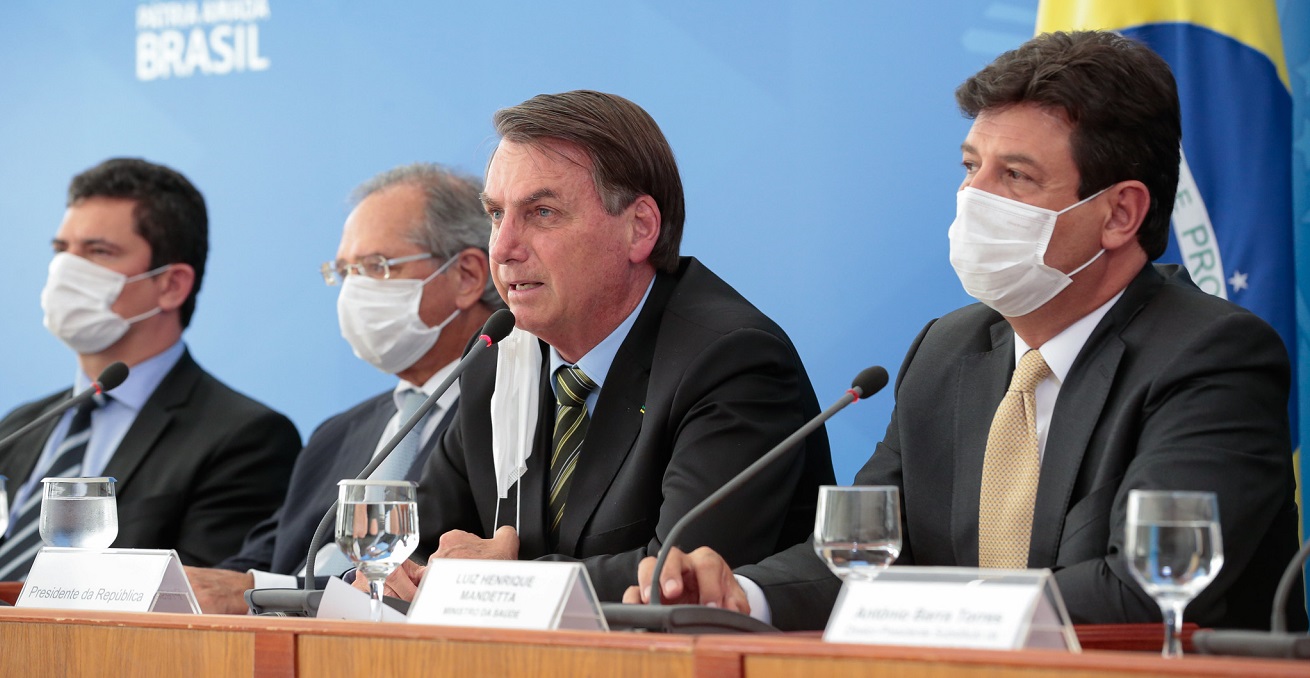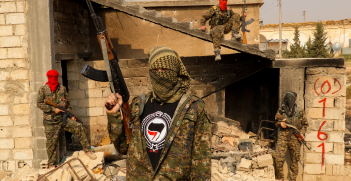COVID-19 in Brazil: Bolsonaro’s Far-Right Authoritarianism in a Pandemic

Brazil is holding anti-lockdown protests. Deemed by many to be the “Trump of the Tropics,” Brazil’s far-right president Jair Bolsonaro continues downplaying the imminent threat of the coronavirus pandemic.
Ironically, Brazil’s coronavirus crisis is unfolding quickly since Bolsonaro’s March visit to the US. His press secretary Fabio Wajngarten has tested positive for the virus. In a twist of fate, Fox news reported that president Bolsonaro himself had contracted the virus. Later, Bolsonaro declared by tweet that his second coronavirus test came out negative, though no evidence was shown either to the Brazilian or international press.
Echoing US president Donald Trump, Bolsonaro stated during his March visit to the US, “Obviously we have a moment of crisis, a small crisis. In my opinion much more a fantasy, the coronavirus issue, which is not all that the mainstream media propagates throughout the world. Some of the press managed to make oil prices fall, but this is not a crisis, obviously a stock market problem, it happens sporadically.” Throughout January and February 2020 Trump was similarly in full denial mode. In March, Trump tweeted “So last year 37,000 Americans died from the common Flu. It averages between 27,000 and 70,000 per year. Nothing is shut down, life & the economy go on. At this moment there are 546 confirmed cases of CoronaVirus, with 22 deaths. Think about that!”
Today, the number of coronavirus cases in the US numbers in the hundreds of thousands, with New York City “in a race against time” as death tolls steeply rise to over ten thousand people, far exceeding 9/11 casualties. Could Brazil soon be following a similar path, or is it heading toward something even worse?
Bolsonaro’s lockdown defiance
Recently, President Bolsonaro accused his political foes and the press for “tricking citizens” about the threats posed by the coronavirus. Bolsonaro argued that Brazil needs to return to business as normal since the virus affects only the older population and rarely results in death for individuals in their 40s. Bolsonaro also stated that with his athletic biotype, he would not be concerned if he contracted the virus. This statement raised concerns even within members of his support base.
Going against the World Health Organization (WHO) advice, Bolsonaro criticised Brazil’s minister for health, Luiz Henrique Mandetta, for encouraging social distancing and business closures. Bolsonaro also criticised the state governors who are following Mandetta’s and the WHO advice.
In a recent interview, Bolsonaro deemed Rio de Janeiro Governor Wilson Witzel’s lockdown measures, including beach closures, “dictatorial.” The lack of unity between federal and state governments is a dangerous gamble in a country like Brazil, which has high levels of illiteracy, because it generates confusion and disregard for public health risks.
Worryingly, Bolsonaro has reminded Brazilians that he holds the power to sack his ministers, implying that Minister Mandetta could soon be dismissed. President Bolsonaro stated, “We expect him to do the job. I’ve been talking to him. He’s in a bit of a situation … If he does, well, no problem. No minister of mine is undismissible.” Bolsonaro further said ,“perhaps he is right” but Mandetta “lacks humility.”
Bolsonaro’s lack of support for Brazil’s state-led lockdowns instigated his support base to organise nationwide protests against the lockdown, calling for Brazil’s commerce to re-open. During this pandemic there are increasing fears of social unrest.
Bolsonaro’s increasing authoritarianism and fears for Brazil’s most vulnerable
Brazil has more than 28,000 confirmed coronavirus cases, and the virus has claimed 1,760 lives. Recently the first case was confirmed in a favela in Rio, where there are cramped living conditions and no access to clean water or sanitisation. If social distancing measures and lockdowns are not enforced, contamination could reach unprecedented levels, with the socio-economically vulnerable at the forefront of Brazil’s outbreak. The confirmed cases in the state of Amazonas are another matter of concern. If the virus reaches Brazil’s indigenous communities they could be completely wiped out as they lack flu virus immunity. Since the outbreak, the incumbent administration has restricted access to Brazil’s indigenous reserves, but there are already suspected cases. Amazonas lacks infrastructure, and authorities have declared the state’s health system collapse. Other states are currently assisting with medical staff and resources.
Yet President Bolsonaro insists that if social distancing measures are not relaxed and commerce does not gradually return, he will “By the strike of a pen authorize the return to the activities of the traders, who took a blow on the head with the measures taken by some governors.” There is no evidence that Bolsonaro, together with the armed forces, will pressure states to re-open commerce. This has raised eyebrows about an increasingly authoritarian trend in Brazilian politics.
Bolsonaro’s push to re-open Brazil’s commerce gave rise to anti-Bolsonaro protests, called panelaços, throughout Brazil’s major cities. In the panelaços, citizens hit pans and screamed “out Bolsonaro” from their windows. In 2015, there were similar protests against former President Dilma Rousseff of the Workers Party, leading to Rousseff’s impeachment in 2016. Brazil’s history of great social polarisation in moments of crisis could lead to social fragmentation in this pandemic.
According to a Data Folha poll, Bolsonaro holds a 33 percent approval rating. Brazil’s governors hold 58 percent, and Health Minister Mandetta enjoys 76 percent of popular approval. This increases fears that Bolsonaro’s authoritarian push to relax Brazil’s lockdown and social-distancing measures could lead to social unrest.
Last week Brazil’s senate approved a monthly stipend of $AU186 for workers who were self-employed and could no longer work. Low-income Brazilians can claim a family stipend, with some families receiving between $AU 370 and $AU 490 per month. Yet some argue that Brazil’s coronavirus financial package was slow to approve and timid, with Brazil’s support to the poor at a lower level compared to other countries’ coronavirus relief packages.
An uncontrolled pandemic in Brazil will disproportionally affect those of African descent, economically vulnerable populations living in Brazilian favelas, and Brazil’s first peoples. Brazil’s Universal Health System (SUS) funds have been strangled since Constitutional Amendment 95 in 2016, with very few resources available to look after the poor. Amid the pandemic, the federal government has increased Brazil’s public hospitals expenditures– but is there enough time to prepare and can the system cope? Brazilian elites have private health care and access to high-tech private hospitals, so they certainly will have medical assistance if needed. In Brazil, some are more equal than others.
The virulence of this pandemic demands strong national and international cooperation to eradicate contamination pockets. Bolsonaro’s anti-science and authoritarian ideological madness puts in jeopardy not only the health of the Brazilian population and the future of Brazil’s democracy, but compromises regional and international stability.
Flavia Bellieni Zimmermann holds a Bachelor of Laws with Honours from the Pontifical Catholic University in Rio de Janeiro and a Graduate Diploma of International Relations and National Security from Curtin University, Western Australia. She is currently a PhD Candidate at the University of Western Australia Centre for Muslim States and Societies.
This article is published under a Creative Commons Licence and may be republished with attribution.




